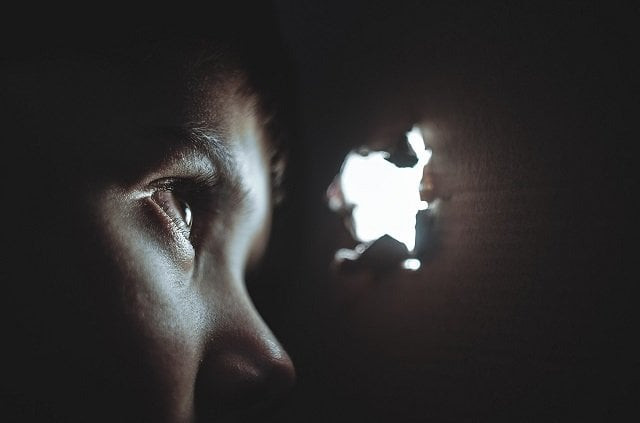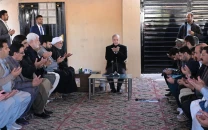Child sexual abuse: Let’s talk before it’s too late
Despite being prevalent in society, sensitising children about sexual violence remains taboo in Pakistani households

PHOTO: EXPRESS/FILE
But despite the government’s efforts to minimise incidents and the role played by media in creating awareness, having an open discussion with children about sexual violence remains taboo in Pakistani households – an attitude that significantly adds to the problem.
Speaking out and being heard
It took B* -- who is a survivor of child sexual abuse -- 24 years to open up about her ordeal and confide in her mother.
“I was only five-years-old when my neighbour started molesting me,” B* told The Express Tribune. “Even as a child, I could sense that something bad was happening to me, but I could not stop him out of fear. He continued to do it for a year before his family moved out of the apartment.”
B* said that she did not know what sexual abuse was, as neither her parents nor schoolteachers ever talked about it.
“Unlike today, there was no awareness of sexual violence against children in the 1990s. My mother never thought about stopping me from going to someone else’s house unattended,” she said.
B* has recently started seeing a therapist for treating her childhood trauma which, according to her, has seriously affected her adult life in many ways.
“I never felt safe after the incident and grew up hating myself, thinking that it was my fault. Throughout my childhood, I felt isolated and petrified. Even when I finally told my mother, she was just silent and had no clue what to say. We just hugged each other and cried.”
Eye-opening numbers
In its 2019 annual report on nationwide child abuse cases, Sahil – an NGO working for the protection of children from violence – revealed that throughout the year, a total of 2,846 cases of child sexual abuse were reported in newspapers, indicating a decrease of 26% as compared to 2018.
“On average, eight children are abused in Pakistan every day,” the report stated. “Children belonging to the age group of six to fifteen years are the most vulnerable, while more boys are victimised [as compared to] girls.”
The report further stated that victims as young as a few months old up to the age of five also fall pretty to sexual violence. A total of 3,722 abusers were identified last year, out of which 2,222 were acquainted with the victims -- including, relatives, cousins, neighbours, family friends, clerics, teachers, and even a parent.
The need to sensitise children
According to the United Nations Children's Fund (UNICEF), sexual crimes against children is a gross violation of their rights, yet it happens in all countries and social groups. Sexual violence can take the form of harassment, sexual abuse, rape, or sexual exploitation in prostitution or pornography.
From homes to institutions to schools to workplaces, children can be victimised anywhere. It is, therefore, necessary to talk to children about sexual violence to ensure their safety.
Speaking about the importance of sensitising children about sexual violence amid the growing number of incidents in Pakistan over the past five years, Karachi-based psychologist and counsellor Sana Akbar said that most parents are hesitant to talk about anything related to sexuality because the topic is considered culturally taboo.
“When I initially started practising as a therapist, I realised that most people found it exceedingly difficult to talk about abuse or molestation,” Akbar said. “People had no clarity about their experiences; they were not sure if they were harassed or molested because no one ever explained it to them.”
According to Akbar, talking about sexual abuse should not be a one-off discussion, because sensitisation is a continuous process and parents should always be there to help their children, even during their teenage years.
Mental health advocate and author Ashhad Qureshi agreed and said that children should be taught about the concepts of personal space, body boundaries (safe versus unsafe touch), and general safety from early on, adding that parents can only address the issue if they acknowledge it in the first place.
Obstacles children face when talking about abuse
Qureshi, who has recently authored a children’s book in Urdu called Mera Jism Mera Hai on the topic of child sexual abuse, explained that throughout his extensive work with sexual abuse survivors, he identified several obstacles and factors that stop people from talking about their experiences.
“The first hurdle is the inability to communicate. Even when children realise that the things happening to them are wrong, they lack the vocabulary and a safe space to have those conversations,” he said. “Besides, perpetrators often threaten or manipulate survivors and coerce them into silence.
He added that survivors often feel ashamed, embarrassed, and guilty about their ordeal and blame themselves for letting the incident happen, even though—and this cannot be stressed enough—it is not their fault.
“Many a time, survivors may not know who to confide in, especially when the perpetrator is a parent. In such cases, they feel that disclosure might result in losing the parent, which can worsen the trauma.”
Expounding on Sana’s point, Qureshi said that topics related to sexuality, even when it is for the propose of education and safety, are considered vulgar in Pakistan.
“Oftentimes, parents even dismiss their children’s experiences as exaggerated or entirely made-up and reprimand them for lying instead of helping. The societal stigma associated with sexual abuse/assault is so strong that blame is almost always assigned to victims who are thought to have willingly brought it upon themselves.”
Child psychologist Hira Fatima, who works as a counsellor at private school in Lahore, shared an anonymous student’s story who was molested by her maternal uncle. The girl’s father had died because of which she had to move to her uncle’s house with her mother.
“When the child told me what her uncle was doing to her, the school authorities called her mother to discuss the problem. But instead of confronting her brother, she denied the allegations and started beating her daughter for lying.”
Hira said both young boys and girls are vulnerable to sexual abuse, adding that when the victim is a female child, parents often force them to stay quiet to preserve the "honour" of the family.
When male children are sexually abused, confiding in someone becomes a bigger challenge for them because of the norms that society has set about masculinity. As a result, if male children talk about their abuse, they are mocked for being weak and unmanly – an attitude that often silences them forever.
The most common factor that discourages survivors to talk about abuse, however, is ignorance on part of the parents or primary caregivers.
“During my practice, I came across another case where a girl was molested by her elder brother for years. When she finally spoke up as a teenager, her mother shushed her, saying that there is no point talking about things that happened in the past. Such behaviours discourage victims from opening up,” Fatima said.
Having ‘the talk’
According to Qureshi, the best way to teach children about sexual violence is to have honest and straightforward conversations with them.
“It is crucial for parents, guardians, and primary caregivers to establish a relationship of trust and openness with children where the latter are not only aware of how to protect themselves as best as they possibly can, but also know what they should do if someone behaves inappropriately with them.”
Talking about his book Mera Jism Mera Hai, he explained how he has included colourful pictures and child-friendly language in the book which would help both children and parents navigate through situations and conversations.
“I have also included an activity for children in the book to build their safety network, have provided guidelines for parents and caregivers, as well as mental health and legal resources for survivors. It has been the result of years of research, vetting from public health and mental health professionals, and cultural sensitivity testing. I aim to have the book incorporated into school curricula and have it become a driver of discussion in Pakistani households.”
Sana Akbar suggested that if a child opens up about their ordeal, parents or primary caregivers must display empathy, transparency, and the willingness to listen.
“It is important to talk to your children about different feelings and encourage them to identify and share when they feel sad, angry or scared,” she said. “I explain the topic through storytelling during therapy sessions. The response has been quite positive.”
For parents and adults talking to children about sexual abuse and responding to their questions, Akbar suggested that one must be careful about using age-appropriate terms and ways in which the information can be relayed.
“Avoid giving detailed or in-depth information of a sexual nature to young children,” she stressed.
Preventative measures
According to Hira Fatima, apart from teaching children about the basics of good touch and bad touch, parents should also take other important measures to keep their children safe from perpetrators.
“I suggest that parents should teach their children some defence strategies in case they experience a bad touch,” she said. “It is also important for parents to maintain a friendly attitude toward children and encourage them to share their daily activities, as well as talk about people they have interacted with."
Fatima also advised that parents should never let their children go to someone’s house alone, not even to a close relative’s place. If a child makes new friends, it is important to meet the friend’s parents and try to know about their family environment. The common practice of sending young children to shops should also be discouraged.
Warning signs to watch
If a child does not open up about their experiences of sexual abuse, there are telltale signs that they might exhibit, indicating that something is not right.
“Look out for unexplained bruising or bleeding on a child’s body,” Hira Fatima said. “Child victims of sexual abuse could also be seen touching their private parts or using sexually explicit words and phrases.”
Other signs include bedwetting, refusal to interact with a particular adult or an unusual attachment with them, performing inappropriate sexual acts with their toys and dolls, and experiencing frequent nightmares, among others.
The role of schools
Ensuring the safety of children is not only the duty of parents but given the increasing number of sexual abuse cases in the country, schools should also actively educate children about the issue.
“Ideally, schools should arrange workshops to teach both teachers and parents about child sexual abuse,” Fatima said. “Unfortunately, most schools in Pakistan hesitate from openly discussing such topics because of the stigma attached to abuse victims as well as possible backlash from parents and guardians.”
She added that society shows a lot of anger and remorse when child rape cases make headlines, but when it comes to finding solutions, no one seems to be ready for that.
“As a child psychologist, I urge parents and teachers to take child sexual abuse seriously and play their role effectively in preventing this horrendous crime before it is too late."
*Name of survivor concealed to protect identity.



















COMMENTS
Comments are moderated and generally will be posted if they are on-topic and not abusive.
For more information, please see our Comments FAQ